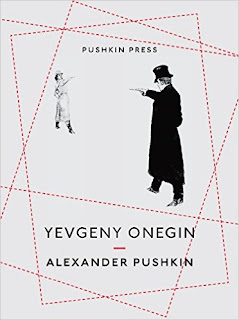Surprisingly accessible
5 stars
I haven't read any other translations of Alexander Pushkin's famous poem Yevgeny Onegin so cannot comment on how Anthony Briggs' work differs, but I was surprised at how readable he has rendered the poem. I admit I had been putting it off, expecting something quite impenetrable so was pleased to find myself actually enjoying the story and the humour. I particularly loved the descriptive passages which vividly paint snowy Russian villages, exciting sleigh rides and a wonderful ball. The storyline itself is not complicated and relies heavily on well-rounded and believable characters to carry its more melodramatic moments. I happily despised the initially heartless Yevgeny and sympathised with poor unloved Tatyana. The scholarly technicalities of the poem's structure were mostly lost on me. I understand the theory, but found I preferred to be swept along with the beautiful rhythms of the piece than to frequently pause and analyse why those …
I haven't read any other translations of Alexander Pushkin's famous poem Yevgeny Onegin so cannot comment on how Anthony Briggs' work differs, but I was surprised at how readable he has rendered the poem. I admit I had been putting it off, expecting something quite impenetrable so was pleased to find myself actually enjoying the story and the humour. I particularly loved the descriptive passages which vividly paint snowy Russian villages, exciting sleigh rides and a wonderful ball. The storyline itself is not complicated and relies heavily on well-rounded and believable characters to carry its more melodramatic moments. I happily despised the initially heartless Yevgeny and sympathised with poor unloved Tatyana. The scholarly technicalities of the poem's structure were mostly lost on me. I understand the theory, but found I preferred to be swept along with the beautiful rhythms of the piece than to frequently pause and analyse why those rhythms and rhymes are so effective.
I think, based on this reading of Yevgeny Onegin, that I would like to tackle more of Pushkin's writing, especially if it has been translated by Anthony Briggs. I liked his style and the interesting essay with which he begins the book that describes the challenges of the translation and the relationships between the languages involved. I didn't realise French was the primary upper class language in Russia in Pushkin's time - much like it was in England in the Middle Ages - but this does explain to me the fluency in French of characters in my other recent Russian read, The Gambler by Dostoyevsky.

